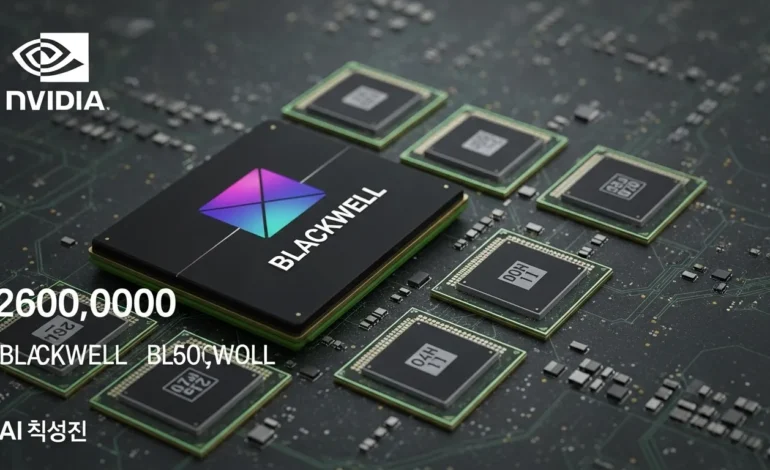Nvidia to Supply Over 260,000 Blackwell AI Chips to South Korea

Table of Contents
Nvidia has announced one of the largest artificial intelligence infrastructure commitments in its history. The company will supply over 260,000 Blackwell AI chips to South Korea through a strategic partnership announced during the Asia-Pacific Economic Cooperation summit in Gyeongju.
This massive GPU deployment represents a transformative moment for South Korea’s technological future and signals Nvidia’s confidence in the region as an AI powerhouse. The 260,000 units will be distributed across government agencies and leading Korean corporations, fundamentally changing how the nation approaches artificial intelligence development and manufacturing innovation.
Understanding the Scale of Nvidia’s Commitment to South Korea
The 260,000 Blackwell GPUs that Nvidia will deliver to South Korea represent far more than a standard corporate transaction. This shipment is the largest volume the company has pledged to any single country, emphasizing South Korea’s strategic importance in the global AI landscape.
To put this into perspective, South Korea currently operates approximately 45,000 to 65,000 advanced Nvidia GPUs, meaning this new commitment will increase the nation’s total AI GPU capacity to over 300,000 units.
The financial implications are staggering. Given that Nvidia’s Blackwell B200 GPUs cost between $30,000 and $40,000 per unit, the total value of this arrangement ranges from $7.8 billion to $10.4 billion, equivalent to approximately 14.8 trillion Korean won. This substantial investment demonstrates the critical importance of graphics processing units in modern artificial intelligence development and deployment across industries.
Distribution of Blackwell Chips Among Key South Korean Partners
Government and Public Sector Allocation
The South Korean Ministry of Science and ICT will receive 50,000 Blackwell GPUs allocated specifically for developing sovereign artificial intelligence capabilities. These government-owned units will serve as the foundation for a national AI computing center, providing essential infrastructure to universities, research institutions, and technology startups that previously lacked access to cutting-edge GPU resources. This government investment ensures that South Korea’s scientific community can compete globally in artificial intelligence research and development without depending entirely on commercial partnerships.
Samsung Electronics’ AI Megafactory Initiative
Samsung Electronics, the world’s leading semiconductor manufacturer, will deploy 50,000 Nvidia Blackwell GPUs at its newly announced AI Megafactory. Samsung plans to integrate artificial intelligence throughout its entire manufacturing process, from initial product design through mass production of semiconductors, mobile devices, and robotics. This AI integration strategy is expected to dramatically shorten development cycles, enhance manufacturing efficiency, and strengthen Samsung’s competitive position in global semiconductor markets.
SK Group’s Comprehensive AI Infrastructure
SK Group will also receive 50,000 Blackwell GPUs for building its proprietary AI factory. The SK Group ecosystem includes SK Hynix, a critical supplier of high-bandwidth memory for Nvidia GPUs, and SK Telecom, which will deploy GPUs for industrial cloud services across Asia. SK Hynix plans to use artificial intelligence for semiconductor design acceleration, while SK Telecom will launch industrial AI clouds specifically targeting startups, enterprises, and government agencies seeking digital twin and robotics innovation capabilities.
Hyundai Motor Group’s Advanced Technology Development
Hyundai Motor Group will receive 50,000 GPUs for advancing artificial intelligence applications in autonomous driving, in-vehicle AI systems, and robotics technology. This allocation reflects Hyundai’s ambition to become a leader in physical AI applications, where artificial intelligence controls and optimizes real-world manufacturing and transportation systems. Hyundai signed a trilateral memorandum of understanding with Nvidia and South Korea’s Ministry of Science and ICT to formalize this technological partnership.
Naver’s Cloud Infrastructure Expansion
Naver, South Korea’s largest technology company, will receive 60,000 Blackwell GPUs, the largest allocation among private companies. Naver plans to expand its cloud infrastructure and develop specialized large language models designed specifically for the Korean language and domestic industrial applications. This investment positions Naver to compete with international AI platform providers while maintaining Korean language processing advantages.
Strategic Importance for South Korea’s AI Development
Closing the AI Leadership Gap
South Korea has historically lagged behind the United States and China in general-purpose artificial intelligence development, particularly in large language models comparable to OpenAI’s ChatGPT or Google’s Gemini. However, the nation possesses exceptional strengths in manufacturing, semiconductor production, robotics, and automotive technology. Rather than attempting to compete directly in consumer-facing AI applications, South Korea’s strategy focuses on what analysts call vertical artificial intelligence capabilities, where AI becomes deeply integrated into manufacturing processes and industrial applications where Korean companies excel.
The Blackwell GPU allocation enables this strategic approach. Manufacturing companies can now deploy artificial intelligence to optimize production workflows, implement digital twin technology that creates virtual replicas of physical factories, and develop physical AI systems that control robots and autonomous machinery. This manufacturing-focused AI strategy leverages South Korea’s existing competitive advantages while positioning the nation as a leader in industrial artificial intelligence applications.
Building National AI Sovereignty
The South Korean government’s 50,000 GPU allocation directly supports the development of sovereign artificial intelligence foundation models independent from foreign technology providers. This approach ensures that South Korea maintains technological autonomy in critical artificial intelligence infrastructure while developing Korean-language specialized models that serve domestic and international markets.
By establishing a national AI computing center, the government provides equal access to advanced GPU resources for universities, startups, and research institutions previously excluded from cutting-edge artificial intelligence development due to equipment scarcity and cost barriers.
Supply Chain Implications and Industry Benefits
Strengthening Nvidia’s Position in Asia
Nvidia holds a dominant 90% global market share in artificial intelligence accelerators equipped with GPUs, making the company’s products essential for any nation pursuing serious artificial intelligence infrastructure development. The massive Korean deployment reinforces Nvidia’s strategic position in the Asia-Pacific region and demonstrates the company’s commitment to supporting major technological partnerships beyond the United States and Europe.
Accelerating High-Bandwidth Memory Production
The increased demand for Nvidia GPUs from South Korea will dramatically boost orders for high-bandwidth memory, or HBM, supplied by SK Hynix and Samsung Electronics. SK Hynix is virtually the sole current supplier of HBM3E memory, the critical component that enables Nvidia’s most advanced GPUs to handle large-scale artificial intelligence workloads efficiently. Samsung Electronics actively collaborates with Nvidia on both HBM3E and the next-generation HBM4 specifications, creating a mutually beneficial relationship where increased GPU demand directly translates into higher HBM orders and manufacturing capacity expansion.
This supply chain dynamics benefit both Nvidia and South Korean semiconductor manufacturers, creating what industry analysts describe as a win-win structure where international GPU demand strengthens domestic memory chip producers and enhances their technological capabilities.
Real-World AI Factory Applications
Digital Twin Technology in Manufacturing
South Korean companies receiving Blackwell GPUs will implement digital twin technology, creating accurate virtual representations of physical manufacturing facilities. These digital twins allow manufacturers to simulate production processes, test optimizations, and troubleshoot problems in virtual environments before implementing changes on actual factory floors. This approach reduces production downtime, minimizes costly manufacturing errors, and accelerates the testing of new production methodologies.
AI-Powered Design and Development
Samsung, SK Hynix, and Hyundai will leverage Blackwell GPU capacity to accelerate computer-aided design processes using artificial intelligence physics simulation. This technology enables engineers to evaluate product designs, material properties, and manufacturing processes dramatically faster than traditional simulation methods, reducing development timelines from months to weeks or days.
Autonomous Systems and Robotics
Hyundai’s GPU allocation supports development of autonomous vehicles, robotic manufacturing systems, and physical AI agents that can operate independently within industrial environments. These systems require enormous computational power to process sensor data, make real-time decisions, and coordinate complex movements. Blackwell GPUs provide the necessary processing capacity for these advanced autonomous applications.
Regional Positioning and Global Competition
Competing for Asian AI Leadership
This Nvidia commitment positions South Korea as a serious contender for regional artificial intelligence leadership in Asia-Pacific, competing directly with Singapore and Japan for infrastructure investments and multinational AI development centers. The combination of government support, private sector commitment, and manufacturing expertise creates a unique ecosystem where international companies can establish substantial artificial intelligence operations with government backing and local technological excellence.
Nvidia’s Global Strategy
Beyond South Korea, Nvidia has announced significant GPU commitments to other regions. The United Kingdom will receive 120,000 Blackwell GPUs, and Germany will receive 100,000 units, but neither commitment matches the scale of the South Korean deployment. This prioritization reflects Nvidia CEO Jensen Huang’s strategic assessment that South Korea represents uniquely valuable opportunities for industrial artificial intelligence applications where the nation’s manufacturing and semiconductor expertise creates competitive advantages unavailable elsewhere.
Timeline and Implementation Challenges
Phased Deployment Strategy
While Nvidia has not disclosed specific delivery timelines or detailed implementation schedules, the company typically deploys large GPU orders in phases over 12 to 24 months. The initial deployment of 13,000 units to South Korea’s government-led projects will establish foundational artificial intelligence infrastructure and begin training programs for researchers, engineers, and technology professionals. Subsequent deliveries will expand capacity at private companies, supporting the development of AI factories and specialized applications across Samsung, SK Group, Hyundai, and Naver.
Infrastructure Requirements
Deploying 260,000 high-performance GPUs requires substantial supporting infrastructure including specialized data centers, advanced cooling systems, high-capacity power supplies, and dedicated network connectivity. South Korea’s existing technological infrastructure and government support for data center development position the nation well for managing this massive GPU deployment without significant bottlenecks or delays.
Conclusion:
Nvidia’s commitment to supply over 260,000 Blackwell AI chips represents a pivotal moment for South Korea’s technological development and global competitive positioning. This partnership between Nvidia, the South Korean government, and major industrial corporations fundamentally transforms how the nation approaches artificial intelligence infrastructure and manufacturing innovation.
The GPUs will enable Samsung, SK Group, Hyundai, and Naver to build advanced AI factories integrating artificial intelligence throughout their operations, while government allocations ensure that research institutions and startups can participate in Korea’s AI revolution.
The strategic importance of this Nvidia commitment extends beyond individual companies. By providing sufficient GPU resources to support 300,000 total AI units, South Korea positions itself among the world’s top artificial intelligence infrastructure hubs.
Manufacturing-focused companies can now leverage artificial intelligence to optimize production processes, develop autonomous systems, and create digital twins that revolutionize product development and manufacturing efficiency. Nvidia’s confidence in South Korea’s potential, demonstrated through this record-breaking GPU commitment, validates the nation’s strategy of focusing on industrial artificial intelligence applications where Korean technological expertise provides sustainable competitive advantages.




